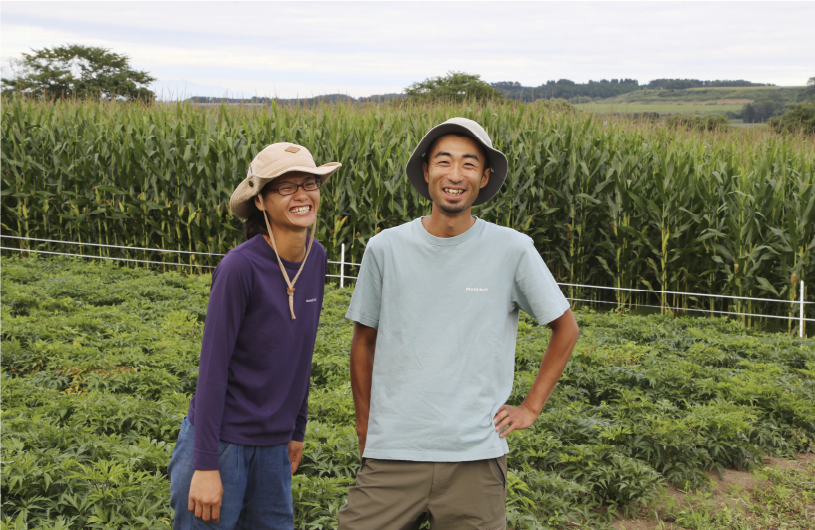
Taiwan-born Fan Hueiting, and Obayashi Makoto from Sapporo

Taiwan-born Fan Hueiting, and Obayashi Makoto from Sapporo
Fan Hueiting comes from Taiwan. She was raised on a tea plantation that dates back to her grandfather's generation, in Hsinchu County. Before marrying, she did research and planning work in the property development business in Taipei. “Every day was busy and my diet wasn't well balanced,” says Hueiting. She met Makoto on a trip to Tokyo and they moved to Niseko after marrying in 2012.

If the vegetables are full of life, they can thrive even among the weeds.
"At the time, I worked on a tourist farm but in order to become independent and establish our own farm, we thought that a small plot of land in southern Hokkaido would be a good place as the winters are shorter than in Niseko," says Makoto. It was meeting the people that led them to decide on Yakumo. The owner of a farm where they did some training said that if they were serious, he would lend them some fallow land, and in the autumn of 2014 they began farming.
"In Taiwan, since about ten years ago, more and more people have been thinking about the safety of food. My grandfather also became ill because of agricultural chemicals, so I had no problems with life based on organic farming," says Hueiting.
Makoto majored in physical geography at university, and became interested in organic farming after being influenced by his teacher. "I love to travel,” he says, "and while I was working part-time on a farm to earn the money to travel, I became genuinely interested in farming. I gained the knowhow regarding pesticide-free, chemical fertilizer-free cultivation at Mahoroba Farm in Sapporo."

Blanched leeks are a Yakumo specialty. It's hard to find organically grown ones.

Japanese ginger sprouts up like bamboo shoots.
Yakumo Sansui Natural Farm covers a 1.4-hectare area of land on which vegetables such as tomatoes, melons, Japanese ginger, peppers, eggplants, carrots, chili peppers and the like are grown. The most important factor is the soil, and adjustments are made to the micro-organisms according to the state of the crops. "Safety and reliability should be taken for granted. If you grow vegetables that are full of life, the taste becomes delicious, naturally."

Touki roots (Angelica acutiloba) used in traditional Chinese kampo medicine

The touki leaves also look delicious.
The November harvest peaks with the touki used as the ingredient for the Traditional Chinese kampo medicine. It takes about two years before the crop can be shipped, but it can be produced relatively simply without pesticides and is cultivated under contract from the Tsumura pharmaceutical company, providing a stable income. In Japan, shipment is regulated under the Pharmaceutical Affairs Act, but according to Hueiting, "In China and Taiwan, it is often used in cooking like normal ginger and is compatible with any kind of kampo."
"I hope that someday, it will become part of the everyday diet for health reasons in Japan, too," adds Makoto.
Snow doesn't usually accumulate in Yakumo in December, and it melts in mid-March. This is an unusually long cultivation period in Hokkaido. There are seven upland farms in the neighborhood. "They are all so kind and keep an eye out for us." The farmers give vegetables to the fishermen and the fishermen give fish in return. The bartering of goods is an established part of the culture around these parts.

"Despite living on a farm, our fridge is full of fish. It's really great; we sometimes receive bear meat and venison, too," says Hueiting.
The crops in the fields are often damaged by wild animals. Even so, Hueiting manages to look on the bright side. "I've seen deer with their young nearby, and also bear cub. It's like a zoo around here," she laughs. "The Funka Bay scallops are sweet and the abalone from the Sea of Japan are delicious. We make and eat safe, healthy food and then after working in the fields we can relax in a hot-spring bath – there's no better life. Now I'm as content as I've ever been."
The couple have a dream to create a farm to which travelers from around the world drop by to help out with the work.

Touki fields, where the weeding work is endless. On fine days you can see Mt. Yotei.

A farmers' market that stocks natural foods from the region, including vegetables and herbs grown without the use of pesticides and chemical fertilizers is planned. Currently, the vegetables are available from the Yakumo Town's Information Exchange & Local Products Center's Oka-no-Eki.
714-2 Nodaoi Yakumo, Hokkaido, Japan
Facebook